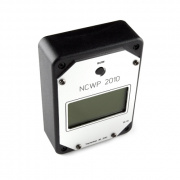Solder of the Ages
Building your latest satellite with old solder? You might want to think it over.
Salutations SparkFunions (are we going to get sued for that?)!
Before I get to the real meat of the post, I'd like to make an announcement. In case all of you aspiring techno-freaks haven't noticed, we've got a new position open in the engineering department. Two, in fact. So are you tired of working for "the Man"? Need more dogs in your workplace? Looking for a job where the words "that's not how you're supposed to use that" get uttered more than once a day? Well, this could be the chance of a lifetime! Check out our jobs section and drop us a resume.
Now on to other things. It's recently come to our attention that (dramatic pause) solder can possibly go bad with age. "What's that?," you say. How did we come to this realization? Before you freak out about all of your SpakFun toys being made with inferior materials, let me say that we have a continuously rotating stock of solder paste and everything's cool. Refrigerated, actually. You gotta do that. No, we came to this by way of an interesting email exchange with a gentleman named Jim Optimus Prime (names have been altered to protect the innocent). Anyway, Jim did a bunch of legwork on this and we want to share his efforts.

What Jim may look like
Does solder have a shelf life? Actually, we never really thought about it. We all use solder that is perhaps 5-10 years old, but does this cause some ill mannered demon to activate? We really aren't sure. Says Jim on the subject:
"Before I emailed SparkFun, I did some online searches on the topic. Summarized the answer is yes, no, and maybe. Solder manufacturers say yes solder has a shelf life (~ 6 months for leaded solder, ~1 year for non-leaded). They have to certify that their solder will have specific characteristics when used by a company to make, say, 10,000 radio units. Large companies buy solder in bulk. They get the solder manufactures to re-certify the solder as their solder stocks age.
"There are a number of hobby users online telling how they still use solder 10+ years old without problems. There are an equal number that talk about all the problems they have with old solder.
"The maybe is the overall conclusion I came to before contacting SparkFun to see if you had a similar take on the question of solder shelf-life. Solder shelf-life centers on oxidation and the deterioration of the rosin core. Tin/Lead solder can oxidize as it ages. Proper storage can slow the process (and no, sitting in a junk drawer isn't considered proper storage). The more oxidation on the solder, the less effective the rosin. The rosin has to overcome the oxidation from the solder as well as whatever oxidation on the parts being soldered. Sometimes with old solder you just can't get the solder to properly "wet" the parts. If solder oxidation is really bad, the way the solder melts and re-solidifies changes, creating a whole new series of problems."
I don't see a problem here.
Jim continues: "The rosin core discussion is a greater mystery. It composition has changed over the years. Some types continue to work. Some types deteriorate. The older versions of rosin were a harsher mix than today and can create corrosion problems.
"For now, I came to the conclusion you can use old solder, but you add another potential problem to your project. In my next SparkFun order I'm going to get a small quantity of fresh 63/37 solder from SparkFun and use it to compare the characteristics of the new solder to the older solder I have on hand. Until I know better I'll stick with buying limited quantities of fresh solder for any project. I'd only use old solder for the 'will this work, what do I need to change' projects. When I reach the stage for a working version I think its best to use 'fresh' solder."
Seems like sound advice, yes? Honestly, I've never bothered considering whether or not solder goes bad. To me, everything I build is a work-in-progress and I'll use anything and everything within eye-shot as raw materials. Heck, I once built a shortwave receiver using 40-year old plumbing solder and that still works. So while I definitely recognize the need to have good solder where large numbers of commercial-grade electronics are concerned (and medical-grade! Nobody wants the machine that goes "ping" to be built with 40-year old solder), I'll likely continue to use whatever is in reach for my own projects.
Thanks for the note, Jim, and thanks for schooling us.







